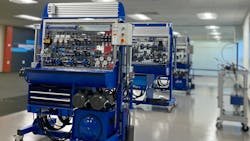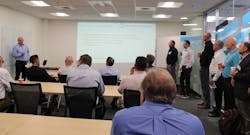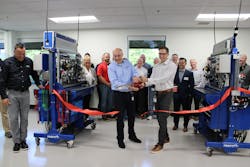Bosch Rexroth Opens Hydraulics Training Center
Bosch Rexroth has opened a new Hydraulics Training Center to help support the technical education needs in the fluid power industry. The state-of-the-art facility will help provide skills development for those just entering the industry as well as seasoned professionals.
"As a leading manufacturer of hydraulic products, it is very important for us to have a state-of-the-art training facility, allowing us to support the future of fluid power," said Phil West, Training Center Manager, Bosch Rexroth, in an interview with Power & Motion.
There is a need for more training in the hydraulics and pneumatics industry to ensure those working in it have the required skills, which Bosch Rexroth hopes to help overcome with its new training center. "With the reduction in the number of big industrial companies offering engineering apprenticeships and their own in-house training, there is a need to fill the gap," said West.
Skills Development for Hydraulics Engineers
The training center is equipped with three advanced training stations to provide practical, hands-on training. Classrooms and conference rooms in the training center provide learning space as well.
Also included in the hydraulics training center are standard industrial components for trainees to work with which adhere to internationally standardized programming languages with open interfaces, ensuring trainees are prepared to work with technology available in the market.
Creation of the training center enables Bosch Rexroth to offer its hydraulics expertise for a wide range of industries. In addition, West said "We have a unique advantage of having our training center embedded within our manufacturing campus and have a supply of extremely qualified hydraulic engineers at our disposal."
This will help provide access to current technologies and hydraulics engineering knowledge to help enhance the educational experience.
READ MORE: Schools Working to Prepare the Engineers of the Future
Bosch Rexroth plans to offer training courses covering a range of subjects — including hydraulics, electric drives, control technology and more. "Digitization and automation are very much part of the operation of today’s hydraulic systems. Therefore, it is essential that design engineers, commissioning engineers and maintenance engineers have an understanding of more than just the fluid running through pipes," said West.
By covering an array of applicable subjects through its training courses, the company aims to provide the wide breadth of knowledge necessary for working in the hydraulics industry today, as well as in the future given the fast pace at which technology is changing due to increasing digitization and automation as West pointed to as well as electrification and other trends.
"We have structured our courses to cover all aspects of hydraulic learning and will be hosting students new to the industry with our Basic Hydraulics Training Course," said West. "We also offer courses for experienced engineers with a program of advanced classes tailored to specific customer requirements."
Bosch Rexroth plans to hold courses throughout the year at the new hydraulics training center, offering multiple learning opportunities for the engineering community. The first set of courses are set to begin in January 2024 with more in the works for the remainder of the year:
- Basic Hydraulics: This introductory course is tailored for those new to hydraulics, delving into fundamental principles.
- Proportional Hydraulics: Offering a deeper insight into hydraulic technology, this course explores electro-proportional hydraulic valves, their operation, control, and troubleshooting.
- Hydraulic Setup, Commissioning and Maintenance: Providing practical knowledge in planning and executing hydraulic system work, measuring performance, and problem-solving.
- Design Considerations for Industrial Hydraulics: Essential for system improvement and new hydraulic application design, this course covers load evaluation and valve selection.
- Hydraulic Pump/Motor Controls: Enhancing knowledge of fixed and variable displacement piston pumps, motors, and control technologies.
Editor’s Note: Power & Motion's WISE (Workers in Science and Engineering) hub compiles our coverage of workplace issues affecting the engineering field, in addition to contributions from equity seeking groups and subject matter experts within various subdisciplines.
About the Author
Sara Jensen
Executive Editor, Power & Motion
Sara Jensen is executive editor of Power & Motion, directing expanded coverage into the modern fluid power space, as well as mechatronic and smart technologies. She has over 15 years of publishing experience. Prior to Power & Motion she spent 11 years with a trade publication for engineers of heavy-duty equipment, the last 3 of which were as the editor and brand lead. Over the course of her time in the B2B industry, Sara has gained an extensive knowledge of various heavy-duty equipment industries — including construction, agriculture, mining and on-road trucks —along with the systems and market trends which impact them such as fluid power and electronic motion control technologies.
You can follow Sara and Power & Motion via the following social media handles:
X (formerly Twitter): @TechnlgyEditor and @PowerMotionTech
LinkedIn: @SaraJensen and @Power&Motion
Facebook: @PowerMotionTech

Leaders relevant to this article:




